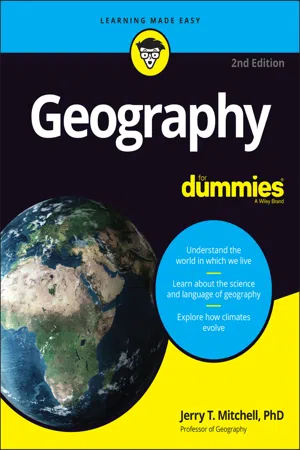
- English
- ePUB (mobile friendly)
- Available on iOS & Android
Geography For Dummies
About this book
The whole world in the palm of your hand
Ever wonder how you can have a rainforest on one side of a mountain and a desert on the other? Or zoom around the globe with Google Maps and wonder how everything got to where it is now? The answer is…geography.
In Geography For Dummies, you'll discover that geography is more than just cool trivia—it explains tons about the world around us. From understanding the basics—like how to read maps and geographic coordinates—to learning about how the continents got to their current positions, you'll learn fascinating things about the planet's people, cities, resources, and more.
In this book, you'll discover:
- How geographers make and use maps to understand and tell useful stories about the earth
- How weather and climate shape the planet, impact the water supply, and change landscapes
- How humans use (and overuse) the planet we live on to our advantage
Geography For Dummies is an incredible exploration of our planet and the people who live on it. This book takes a huge subject and makes it accessible for the rest of us!
Tools to learn more effectively

Saving Books

Keyword Search

Annotating Text

Listen to it instead
Information
Getting Grounded: The Geographic Basics
Geography: The Why of Where and Why You Should Care





Geography: Making Sense of it All
From ancient roots …
Disputed paternity
Links to exploration
… To modern discipline
Table of contents
- Cover
- Title Page
- Table of Contents
- Introduction
- Part 1: Getting Grounded: The Geographic Basics
- Part 2: Let’s Get Physical: Land, Water, and Air
- Part 3: Peopling the Planet
- Part 4: Putting the Planet to Use
- Part 5: The Part of Tens
- Index
- About the Author
- Advertisement Page
- Connect with Dummies
- End User License Agreement
Frequently asked questions
- Essential is ideal for learners and professionals who enjoy exploring a wide range of subjects. Access the Essential Library with 800,000+ trusted titles and best-sellers across business, personal growth, and the humanities. Includes unlimited reading time and Standard Read Aloud voice.
- Complete: Perfect for advanced learners and researchers needing full, unrestricted access. Unlock 1.4M+ books across hundreds of subjects, including academic and specialized titles. The Complete Plan also includes advanced features like Premium Read Aloud and Research Assistant.
Please note we cannot support devices running on iOS 13 and Android 7 or earlier. Learn more about using the app

